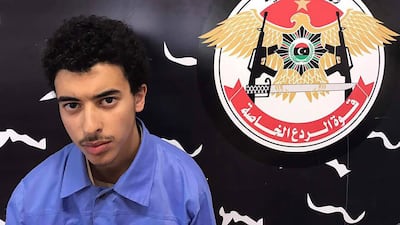Families of victims in the 2017 Manchester terrorist attack have lost hope of justice as a powerful Libyan militia refuses to give up the suicide bomber's brother, who has been held in its custody in Tripoli.
British authorities applied to extradite Hasham Abedi, 21, the brother of bomber Salman Abedi, from Libya to face charges over the attack, which killed 22 people and wounded more than 800.
The UN-backed Government of National Accord in Tripoli says it has agreed to his return to the UK but has been unable to convince the Special Deterrence Force, or Rada, to transfer him.
As the second anniversary of the Manchester Arena bombing approaches next month, officials have been unable to respond to a coroner's demand as to when the extradition will occur.
Without the move, the coroner has been unable to proceed with the inquest.
The solicitor acting for three of the victims’ families is calling for urgent transparency from the British government.
“We have been raising the question of Mr Abedi’s extradition for over a year now," Elkan Abrahamson said.
“We have received nothing of any value from the British authorities and, despite the coroner ordering them in February to provide an update, we have received nothing since then.
“We don’t know where he is, who if anyone is holding him, what stage any negotiations have reached, or whether there even are any ongoing negotiations. We are determined that the delay in extraditing him should not delay the Inquest.
“We think it incumbent, given recent events, on the British Government to provide information urgently.”
British police believe Hashem helped his brother to buy the materials used to make the explosive device used in the attack.
Hashem was living with his father, a Qaddafi-era dissident, and other family members in Tripoli at the time of the attack.
He was arrested by the militia days after the concert bombing and was being held in a prison near Tripoli airport.
While nominally under the control of the GNA’s Ministry of Interior, the force, also known as Rada, is controlled by the former repair shop mechanic, Abdul Raouf Kara.
Mr Kara took control of the capital’s main airport and a large amount territory after Muammar Qaddafi’s downfall in 2011.
A UN report last year painted a fearsome picture of the prison under Rada's control, which was also once the base for the former Al Qaeda warlord Abdulhakim Belhaj.
The report documented cases of torture and ill-treatment, including beatings and torture.
One man claimed to have been strung up like a “roast chicken”.
“Even though I suffer from a disability, I was suspended from the ceiling by metal chains and beaten until I lost consciousness,” a former inmate said.
“Every night I would hear screams of others being tortured. I developed an eye infection in prison but was denied medical treatment to make me suffer more.”
The UN said the testimony was consistent with other detainees’ accounts, including those released in 2017.
Rada is part of the militia force defending the GNA from an advance on Tripoli by the Libyan National Army, which is supported by a rival government in the east.
Fighting in the capital has killed 200 and forced the UN to indefinitely postpone reconciliation talks between the two factions this month.
Abedi is suspected of having helped his brother in the bombing at an Ariana Grande concert at the Manchester Arena.
Attempts to extradite him have also been hampered by the fact that as a dual national with British and Libyan citizenship, he could ask not to be extradited under Libyan law.
But the GNA Attorney General gave commitments to British diplomats to push forward only to be blocked by Mr Kara’s men.
Earlier, a Foreign Office source said it was sceptical that the militia could be relied on to extradite the suspect, saying the group was driven by “score-settling”.
There are also fears over the continuing sway held by Abedi’s father Ramadan, who fought with Bel Haj’s Libyan Islamic Fighting Group in Afghanistan.
A Home Office spokesman refused to give an update on progress but said British officials were still actively seeking Hashem's extradition.
"In the case of the Manchester Arena bombing there is an active criminal investigation ongoing and the extradition of a suspect from Libya is being sought," the spokesman said.
"It is important that these processes are not prejudiced or undermined. We will therefore not be commenting further on the extradition so as not to jeopardise the investigation.”


